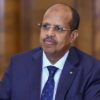British Prime Minister David Cameron, US Secretary of State Hillary Clinton and UN chief Ban Ki-moon were among officials from about 50 countries and organisations gathered to discuss a roadmap for Somalia’s fragile government.
“These problems in Somalia don’t just affect Somalia. They affect us all. If the rest of us just sit back and look on, we will pay a price for doing so,” Cameron said as he opened the conference.
Clinton said the United States would push for sanctions, including travel bans and asset freezes, for those “standing in the way” of progress by the transitional government, the mandate for which expires in August.
She also pledged an extra $64 million in humanitarian assistance to the region to help improve the lives of ordinary Somalis, blighted by famine and civil war for the past 21 years.
“We have come together at a critical halfway point,” she said.
“For decades, the world has focused on what we could prevent from happening in Somalia – be it conflict, famine, or other disasters. Now we are focused on what we can build. The opportunity is real,” she said.
Ban meanwhile urged the world to build on recent progress after the UN agreed to boost the African Union peacekeeping force in the country to 17,000, and after Shabaab Islamist rebels were driven from a key town.
“We have opened a space for peace and stability in Somalia. It is a small space but it presents an opportunity we cannot afford to miss,” Ban said.
In the chaotic Somali capital Mogadishu, residents raised handmade British flags in solidarity with the conference, even as two blasts were reported in Baidoa, the town recaptured on Wednesday.
The conference brings together around 40 countries including the leaders of Ethiopia, Uganda and Kenya, all of which have a huge stake in Somalia’s future, plus the African Union and the Arab League.
But there are doubts about whether the delegates will come up with concrete steps for the Horn of Africa nation when the focus is on other troubles, with Syria set to be discussed at meetings on the sidelines on Thursday.
Somalia has had no effective government since 1991 and in recent years the Shabaab rebels and other militant groups have taken an increasing hold on large parts of the country.
Osama bin Laden’s successor Ayman al-Zawahiri announced last week that Shabaab fighters had joined forces with the Al-Qaeda network.
But in the run-up to the conference there has been some positive news, with the increase of the African Union force that has helped drive the Shabaab out of Mogadishu and other areas.
Cameron said the world now had three key tasks: to help Somalia strengthen security, to get humanitarian aid into places where it was needed, and to help Somali efforts to build a representative government.
The head of Somalia’s weak western-backed government, Somali Prime Minister Abdiweli Mohamed Ali, insisted on the eve of the conference that his country was “moving into an era of peace, stability and normalcy.”
He admitted however that his hopes for a “huge Marshall Plan for Somalia” – echoing the US aid scheme to rebuild post-war Europe – were dim.
Somalia’s chaos has also made it a global centre for piracy in the Gulf of Aden and Indian Ocean, but the international fleet mobilised in 2008 recorded a slight fall in attacks last year against merchant ships.
Famine zones in Somalia declared by the United Nations last August were announced to have improved to emergency conditions earlier this month.
On the political front, Somalia’s president, the presidents of the breakaway Puntland and Galmudug regions, and the commander of the anti-Shabaab militia Ahlu Sunna Wal Jamaa signed a UN-backed deal on Saturday.
But in a sign of low expectations, a follow-up summit is already scheduled for June in Istanbul.















































